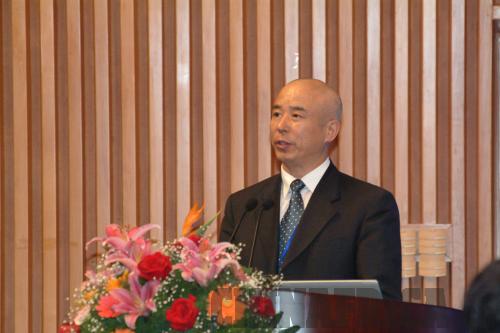|
 |
|
Wang Zhijia |
Climate change affects every country in the world, and protecting the environment has thus become a matter of global concern. With the coordination of the United Nations Environment Program (UNEP), China and some African countries have launched joint projects on environmental protection, with some preliminary progress achieved. Wang Zhijia, UNEP Special Coordinator, recently shared his views with ChinAfrica reporter Ni Yanshuo on the Sino-African cooperation in environmental protection.
CHINAFRICA: Could you please brief us on the Sino-African cooperation projects on environmental protection coordinated by UNEP in Africa? What progress has been made? And How?
Wang Zhijia: UNEP-China-Africa Cooperation on Environment involves the joint efforts of the three parties. In February 2005, then Chinese Vice Premier Zeng Peiyan proposed the program when he was in Nairobi, Kenya for a UNEP conference. At the conference, the Chinese Government donated $500,000. With the fund, UNEF established an environmental protection center in the Republic of Congo. Completed in May 2006, this project won high praise from Denis Sasson-N'guesso, President of the Republic of Congo.
The first phase of the UNEP-China-Africa Cooperation on Environment includes four ongoing projects, involving 17 African countries. The four projects are rainwater collection, water quality monitoring of Lake Tanganyika (the seventh largest lake in the world by area), wastewater treatment and reuse, and drought early warning.
The investment for the first phase of the program hit $1.83 million, and was fully funded by the Chinese Government. UNEP mainly provides support in human resources and coordination. The second phase of the project will start soon this year. In addition to the four existing projects, the second phase has two new projects: water resource management of big river watersheds that mainly focus on the Nile and Lake Victoria, and community-based natural eco-system management.
All these projects were launched according to the demands of African countries under the coordination of UNEP. China offers all the technologies and equipment, and trains technicians from African countries.
African countries warmly applaud the projects. Some of them are yielding preliminary achievements. The rainwater harvesting project is one such project. China is constructing more than 20 water storage facilities at the 100-square-km area of the Ngong Hill region of Kenya. The region has two rain seasons a year. According to experts, about 20 minutes' heavy rain in one season is adequate to fill up all the storage facilities, and the collected water in one storage tank is sufficient to provide drinking water for people in a 3-square-km area until the next rain season.
What's the UNEP's role in this tri-party cooperation on environmental protection?
UNEP has fully applied its capability on communication and coordination to promote environmental protection efforts between China and Africa. UNEP keeps good relations with African countries and China and understands the exact needs of African countries. It solicits their demands and information from conferences such as the annual African Ministerial Conference on Water, the African Ministerial Conference on the Environment and other related conferences of the African Union, and then makes project proposals as a result of this information. After discussion with UNEP, the Chinese Government decides on specific proposed projects based on China's technological advantages.
When selecting projects, UNEP gives priority to six fields: climate change, ecosystem management, hazardous wastes and chemicals management, postwar and post-disaster reconstruction, international environmental management system and green economy.
UNEP attaches great importance to China-Africa cooperation on environmental protection, and UN Under-Secretary General and UNEP Executive Director Achim Steiner has been very supportive of the projects.
What experiences can be shared from the China-Africa collaborative effort on environmental protection?
I think the best experience in China's cooperation with African countries is that it can offer practical technologies. Take the rainwater harvesting project for example. Many other countries also proposed plans to build water storage facilities. Some of them selected stainless steel as the main material, which is solid but very costly. With Chinese technology, it takes only $500 to complete a small storage facility. Most African countries can afford this cost.
Chinese technology can yield achievements quickly. In addition to China, some other countries and organizations have been exploring cooperation with African countries on environmental protection. The European Union (EU) is one of them. Most cooperative projects of the EU and African countries are strategic research programs, conducted from a strategic planning perspective. This kind of research is also very important for the development of a country, but such programs often need longer planning periods and the outcome usually stays on the policy level instead of a practical level. In contrast, Chinese projects directly focus on practial results and tackling specific problems.
What are your expectations of the Climate Change Conference to be held in Durban, South Africa at the end of this year?
I hope each government attends the conference with far-sighted and constructive attitudes, instead of focusing only on bargaining for their own interests or that of a certain interest group. In recent years, climate change has become a more apparent and serious problem, a fact that we need to face.
|